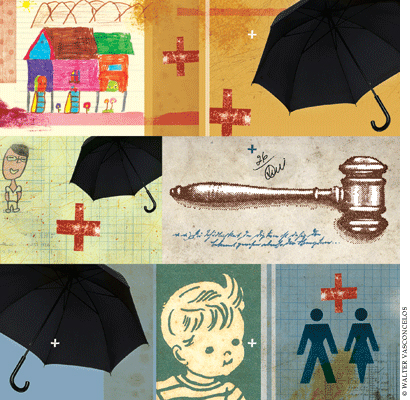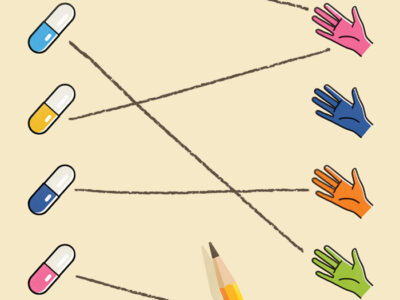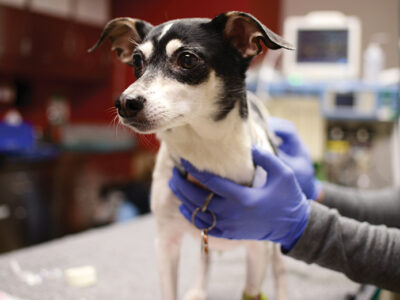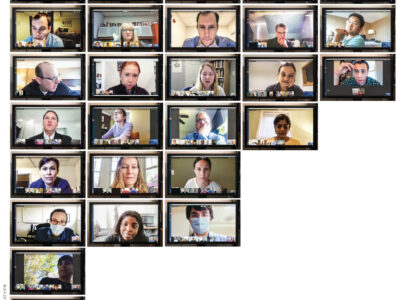
Class of ’85 | Ask Amy Zimmerman C’85 about the people she helps for a living, and the examples come pouring out:
“The family with a lead-poisoned child needs legal assistance to relocate to lead-safe housing. The family with a child who is so medically complex that his parent can’t work needs legal assistance obtaining Security Income support. The family with the child who is bipolar and has been recently psychiatrically hospitalized needs legal assistance to be placed by his school district in a therapeutic day school …”
Unfortunately, there is no shortage of clients for Zimmerman, an attorney at Health and Disability Advocates who oversees the Chicago Medical-Legal Partnership for Children (CMLPC). Fortunately, Zimmerman’s organization exists. The CMLPC provides the pivot of trust for the parties involved in situations with both legal and medical dimensions.
“Before the medical-legal partnership began, doctors we work with told us that they avoided asking questions that could generate legal referrals, because they had nowhere to send the families they work with,” Zimmerman says. “Legal problems felt insurmountable, and they reported feeling incapable of doing more to help families. Now, with CMLPC, they are empowered. And in our clinic settings, families have a true medical home where services are co-located to meet their needs.”
Zimmerman credits her undergraduate experience at Penn with opening her eyes to disparities in standards of living, locally and globally.
Having spent her summers working for the United States Agency for International Development and her junior year in the International Honors Program—traveling and studying cultural anthropology in Kenya, Egypt, and Israel, and living with families in each country—Zimmerman was convinced that she would “end up joining the Peace Corps or going to graduate school in international studies.”
But then she went to Washington to work as an investigator for the General Accounting Office (GAO, now the Government Accountability Office). One night, after watching a documentary about failures in the public welfare system, she looked around at the magnificent limestone complexes that housed the nation’s governmental agencies, and asked herself: “How could our government, housed in such formidable structures, fail so many of our most vulnerable citizens?”
Her answer involved personal action, not rhetoric: She would “try to make a difference at home instead of seeking to go abroad.”
Concluding that making a difference required a law degree, Zimmerman enrolled at Northwestern University School of Law, whose legal clinic quickly became her second home. After graduation, she was hired by the Legal Assistance Foundation of metropolitan Chicago, where her work ranged from domestic violence to housing to child welfare. She began to focus on specialized projects: disability-rights, HIV-AIDS, and finally, children.
Zimmerman’s next move was to become the assistant director of the Health and Education Project at the Chicago Lawyers’ Committee for Civil Rights under Law. There she joined and eventually led a successful class-action suit against the state of Illinois that guaranteed early-intervention services to small children with developmental delays. That, in turn, led to her becoming the children’s policy advisor for Illinois Attorney General Lisa Madigan.
“The best way to develop policy initiatives on behalf of children and families is to have them evolve from and be responsive to real life experiences as opposed to theoretical ideas,” Zimmerman says. “After so many years of working with underrepresented families, it isn’t hard to start to see patterns in the inequities they face and find multiple opportunities to help improve their lives.” While there, Zimmerman helped develop the nation’s most protective children’s product-safety law, limit alcohol advertising aimed at children, and promote children’s mental-health initiatives.
Zimmerman’s current post is overseeing the CMLPC, whose very existence surprises people. “Obviously, the world of malpractice law has created what, for some, is an insurmountable divide,” she says. “Fortunately, we work with enlightened, compassionate, and committed doctors and lawyers that understand that medication alone can’t always heal a child or family in crisis.”
The stark inequities faced by children—in schools, housing, and health-care—are what really drive Zimmerman. While CMLPC and other children’s advocates can make inroads, she says, something else is needed to provide long-term improvements: “fundamental changes in where we invest our dollars and resources.”
—Jordana Horn C’95 L’99




